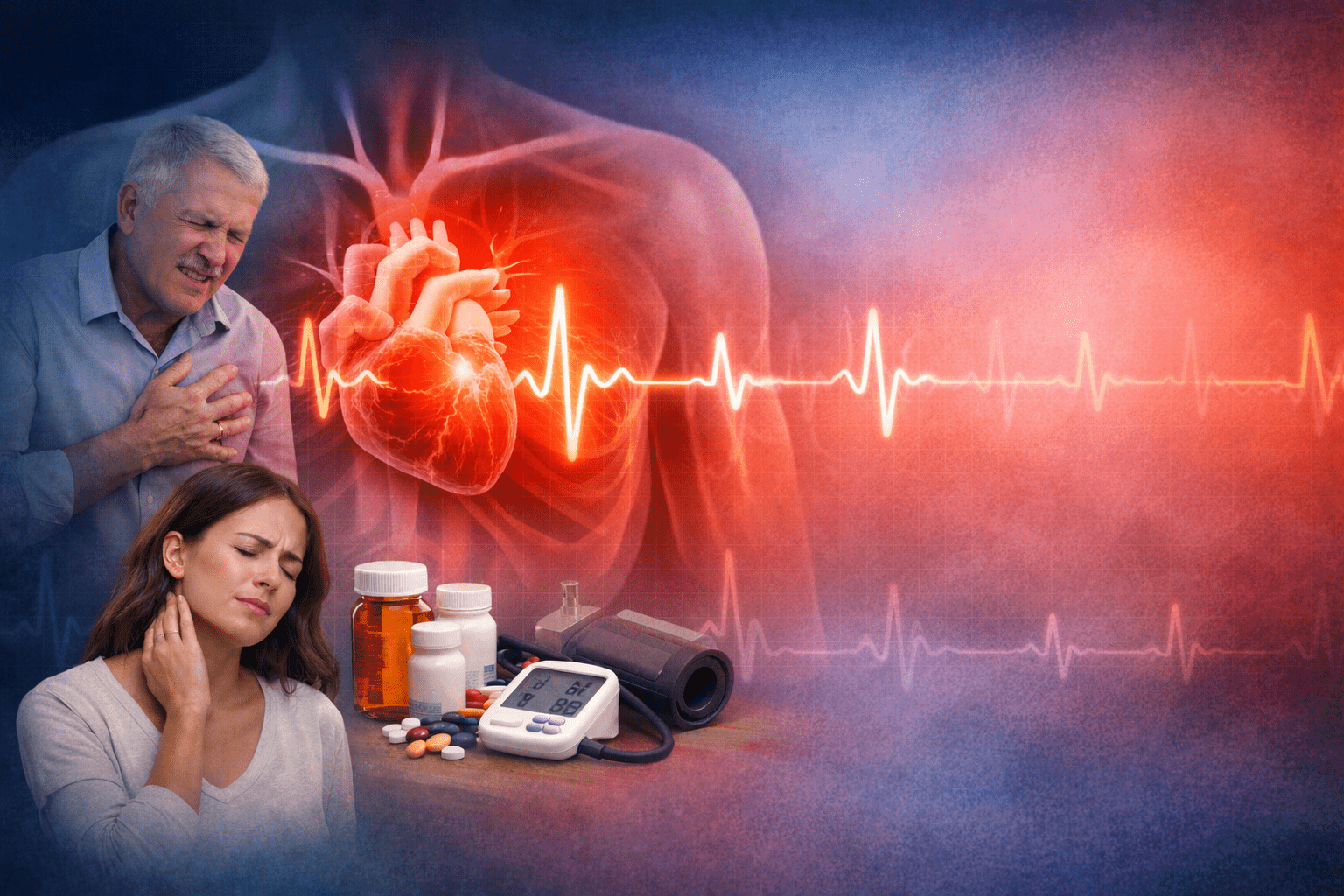Diet for Managing Heart Failure
Discover heart-healthy diet tips for cardiac heart failure treatment management in Burbank, USA. Boost heart health and improve quality of life with our expert advice! Heart failure affects nearly 6 million Americans and over 900,000 new cases are diagnosed each year. It is one of the most common reasons for hospital admissions among those 65 years and older. Heart failure is more likely to happen as we age, but anyone can develop heart failure treatment. Most people who develop heart failure have (or had) another heart condition first. The most common conditions that can lead to heart failure are coronary artery disease, high blood pressure and previous heart attack.
Heart failure occurs when the heart muscle is weakened and cannot pump enough blood to meet the body’s needs for blood and oxygen.
There are many treatment options available for heart failure, which include medications, diet, exercise and lifestyle changes coupled with careful monitoring. The goals of treating heart failure are primarily to decrease the likelihood of disease progression, to lessen symptoms, and to improve quality of life.
Planning what you eat and balancing your meals are important ways to manage your overall health. If you have heart failure, eating a heart-healthy diet can help you feel better and can help your symptoms from getting worse. Here are some basic guidelines that will help you get started:
Limit Sodium Intake. Sodium is a mineral that your body uses in small amounts. It helps keep normal fluids balanced in the body. But, too much sodium makes your body retain excess water and your heart then has to work harder to pump blood.
The American Heart Association says that heart failure patients should consume no more than 2000 mg of sodium a day. This might sound like a lot, but it isn’t. Just one teaspoon of salt has 2300 mg of sodium.
Most people eat foods containing more sodium than they need. Some foods may be high in sodium and not taste salty. So, you have to closely watch what you eat and drink at each meal and snacks.
Following a low-sodium diet helps control high blood pressure, swelling and water build-up (edema), and/or decrease breathing difficulties. A low-sodium diet means more than just eliminating the salt shaker at the table!
Limit Sodium Intake at Home:
- Cook without salt.
- Flavor your food with spices and herbs, lemon, or vinegar instead of using salt or high-sodium bottled dressings or marinades.
- Use low-sodium recipes.
- Eat fresh foods. Avoid processed, frozen and canned foods.
Limit Sodium Intake When Eating Out:
- Order food that is fresh and broiled, baked or grilled. Choose foods that have the lease sodium and fat per serving. Choose mixed green salads or fruit as side dishes.
- Don’t Order food that is fried, frozen, or pre-made. Avoid dishes made with a lot of sauce. Stay away from dips, potato or nacho chips, salsas, pizza, French fries, potato or pasta salads, and soups.
- How to Order: Ask for dressings and sauces to be out on the side. Then, just use a little on your food or don’t use them at all. Tell your server that you don’t want cheese, MSG, salt, seasonings, or butter added to your food.
Learn to Read Nutrition Food Labels. Use the label information on food packages to help you make the best low-sodium selections. Some packaged foods contain more than one servings per container. For example, if the sodium content for one serving is 970 mg, but for the whole package, it is 1940 mg. If you ate all of it, you would almost reach your whole day’s sodium limit of 2000 mg. You should not eat this food since it is too salty! In general, you should focus on avoiding processed foods because they will be higher in sodium.
Limit saturated fats and oils– The best way to reduce cholesterol in your diet is to minimize saturated fat, which is found primarily in animal products, like meat and dairy products. This includes avoiding fatty meats such as beef, pastrami, ribs, steak, ground meat, hot dogs, sausage, bacon, and processed meats like bologna. Replace with skinless chicken or turkey, lean beef, and fish. Also, try some meatless main dishes, like beans and peas, which are a great source of protein and high in dietary fiber.
Avoid trans fats or partially hydrogenated vegetable oils. These oils go through a process that makes them solid and are found in hard margarines, snack crackers, cookies, chips, and shortenings.
Avoid or limit dairy products that contain more than 1% milk fat. This includes cream, most cheeses, and nondairy coffee creamers. Try to switch to dairy-free products.
Avoid fast foods like hamburgers, fries, fried chicken, and tacos. They are high in both total fat and saturated fat.
Avoid or Limit Caffeine. Consume only a moderate amount of caffeine per day, no more than a cup or two of coffee.
Avoid Alcohol. Because alcohol can slow your heart rate and worsen your heart failure, your health care provider may tell you to avoid or limit alcoholic beverages. Alcohol may also interact with medications. If you drink alcohol, do so in moderation. This means no more than one to two drinks per day for men and one drink per day for women, 2-3 times per week. Ask your health care provider for further specific guidelines regarding alcohol.
Include high-fiber foods such as vegetables, cooked legumes (beans), whole-grain foods (brown rice, brown rice pasta, whole wheat bread, steel-cut oats, oatmeal, quinoa), and fresh fruits. Foods high in fiber include antioxidants, which are critical to vascular health. The goal for everyone is to consume 25 to 35 grams of fiber per day.
Making these dietary changes is easier said than done. Dealing with new restrictions and responsibilities is challenging, but working these changes into your daily routine can make a real difference.
Meet Dr. Cynthia Thaik, MD - Functional & Integrative Cardiologist
Dr. Cynthia Thaik is a board-certified cardiologist who integrates functional medicine into her concierge practice with a specialized focus on cardiovascular and neurovascular optimization.
She devotes one week per month exclusively to functional medicine consultations via telehealth, allowing for deep, unrushed care. During this time, Dr. Thaik works closely with patients seeking transformation, root-cause healing, and individualized strategies grounded in integrative science.
Her approach combines:
- Precision diagnostics
- Advanced cardiovascular expertise
- Compassionate, heart-centered listening
- Extensive patient education
“Cardiovascular consultations and diagnostic services are covered by insurance. Functional medicine services are offered exclusively as concierge, self-pay services”
Schedule Your Telehealth Consultation with Dr. Cynthia
If you’re living with atrial fibrillation and want to explore natural treatment options, Dr. Cynthia is here to help. She provides telehealth consultations to guide you through personalized care plans, addressing lifestyle changes, supplement use, and stress management techniques tailored to your unique health needs.
Dr. Cynthia Thaik will perform a thorough cardiovascular assessment, looking at cardiac function, ruling out structural damage, checking paroxysmal atrial fibrillation symptoms, assessing the adverse effects of hypertension and dietary toxicity (alcohol, caffeine, excessive inflammatory foods), checking for vascular inflammation and endothelial dysfunction, and exploring the impact of stress on arterial tone and the autonomic nervous system regulation of the cardiovascular system.
The patient will have an option to receive individual coaching from a mindfulness instructor. Together, this integrative team approach to Afib will provide the patient with the best opportunity to address the root causes underlying the atrial fibrillation and hopefully restore normal sinus rhythm. As with all health conditions, our goal is to help Afib patients transition from symptoms and disease care to optimal health and wellness – true preventive cardiology.
If you have been diagnosed with Atrial Fibrillation and are looking for natural treatments, Schedule a virtual visit or call for Telehealth Appointment at (818) 842 1410
Frequently Asked Questions
Regular palpitations can be a sign of atrial fibrillation. While this condition can continue for years without harm, a consistent increase in heart rate can cause heart enlargement. This is a hazard which can result in heart failure. Atrial fibrillation also comes with an increased risk of stroke from blood clots that can form as a result.
Without a solid understanding of the causes, it can be hard to definitively put a stop to heart palpitations. However, the treatments mentioned above: reducing stress and intake of stimulants, alcohol, and nicotine, exercising more, and eating a balanced diet, are all good steps forward. If your cardiologist determines that you have a more serious heart condition that may be life-threatening, it will require treatment. There are heart medications which can prevent more serious heart rhythm disorders. However, because of their significant side effects, they are not prescribed lightly. Consequences of misuse can lead to heart attacks, or even sudden death.
Some people experience heart palpitations after eating. While those palpitations may be attributable to an underlying medical condition, it is also possible that the food or beverage that was just consumed is responsible. Sugar can have this effect, particularly on hypoglycemic people. Alcohol is another common influence, particularly among those who have paroxysmal atrial fibrillation (PAF). Foods rich in tyramine or theobromine, such as cheese, red wine, bananas, and especially chocolate (which has both), can increase heart rate and may cause atrial fibrillation.
Actually, no. A more likely cause of heart palpitations is in fact low blood pressure. It is true that medication for high blood pressure can have a side effect of causing palpitations, which may be what is happening when someone with high blood pressure experiences palpitations.



